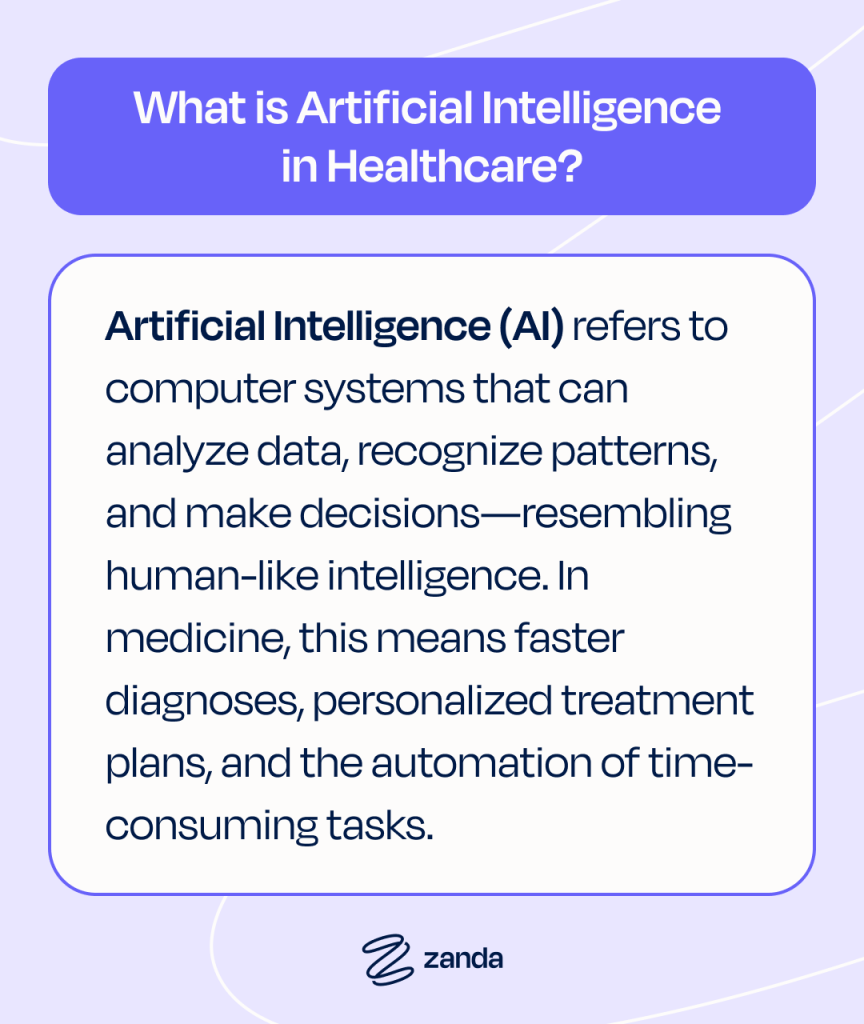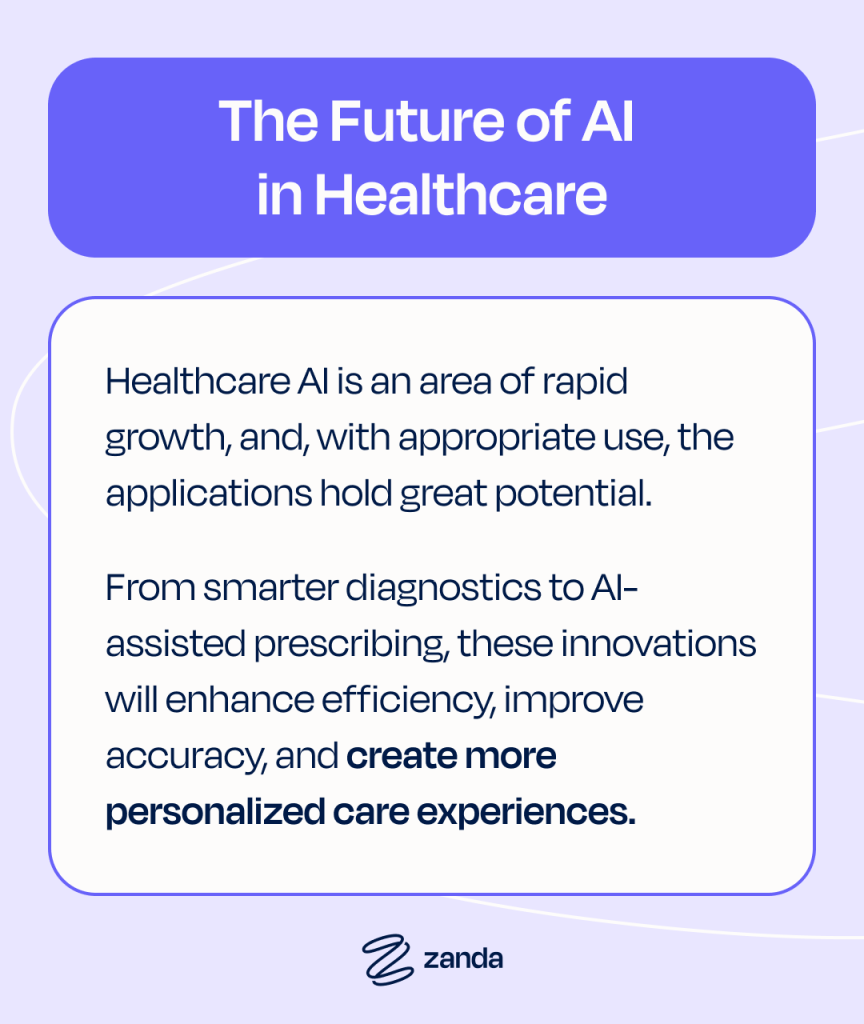What is artificial intelligence in healthcare?
Artificial Intelligence (AI) refers to computer systems that can analyze data, recognize patterns, and make decisions, resembling human-like intelligence. In medicine, this means faster diagnoses, personalized treatment plans, and the automation of time-consuming tasks.
Because AI solutions for healthcare have been developed specifically for medical applications, they go beyond the capabilities of regular AI chatbot offerings like ChatGPT.
Artificial intelligence in healthcare changes the way practitioners deliver care.
From streamlining administrative tasks to enhancing clinical decision-making, AI can facilitate smarter and more efficient care.
How AI and machine learning are being adopted in clinical settings
In many settings, AI and machine learning (ML) are already integrated into daily healthcare operations.
Clinics, hospitals, and private practices use AI-powered tools to:
- Enhance Diagnostics: AI-driven imaging tools help detect conditions like cancer, fractures, and neurological disorders faster and often with greater accuracy
- Predict Patient Outcomes: Machine learning models analyze patient data to identify risks and recommend preventive care
- Streamline Administrative Work: AI-powered systems handle medical transcription and clinical notes, reporting, and reducing time spent on paperwork
Key AI-driven healthcare innovations
- Virtual Assistants and Chatbots: AI-powered chatbots streamline patient inquiries, appointment scheduling, and symptom triaging
- Wearable Health Tech: Smart devices track vitals and alert practitioners to potential health concerns in real time
- EHRs with Built-in AI: Electronic Health Records (EHR) systems with AI capabilities improve documentation, help reduce errors, and enhance patient management
- Robotic Surgery: AI-driven robotic systems assist in precision-based surgeries
How AI can assist doctors and health professionals
AI can’t replace clinicians, but it can save them time.
By automating routine tasks, medical AI applications allow professionals to focus more on delivering high-quality patient care.
AI in clinical decision support
Machine learning models can detect patterns that may not be immediately obvious to humans, helping to identify diseases earlier and more accurately.
These tools provide an extra layer of support, offering insights, flagging potential concerns, and suggesting next steps.
Enhancing medical documentation and charting
Administrative tasks, particularly documentation, can take up a significant portion of a clinician’s day.
AI is changing that by:
- Transcribing consultations in real time and summarizing key details
- Identifying inconsistencies or missing information to improve accuracy
Improving doctor-patient communication
Medical conditions can be complex and difficult for patients to understand.
AI-driven innovations can improve patient engagement, helping people feel informed and empowered about their health by:
- Translating medical jargon into clear, accessible language
- Generating personalized health summaries for patients post-consultation
- Providing multilingual support for diverse patient populations
AI in medical research and education
Medical research generates vast amounts of data, from clinical trials to real-world patient outcomes. By processing complex data at scale, AI accelerates discoveries that might otherwise take years to uncover by:
- Identifying patterns and correlations within massive datasets
- Predicting disease trends and potential outbreaks
- Enhancing drug development by analyzing molecular interactions faster than humans alone
- Providing interactive case studies to simulate real-world diagnoses
- Assisting with exam preparation through AI-powered Q&A systems
- Delivering real-time feedback on clinical reasoning and decision-making
AI in healthcare administration
Beyond clinical applications, AI is streamlining healthcare operations by:
- Automating appointment scheduling to reduce no-shows and optimize calendars
- Processing insurance claims and detecting errors before submission
- Keeping health practitioner burnout at bay by taking care of essential but time-consuming admin
While ChatGPT in healthcare can assist researchers by summarizing studies and generating hypotheses, more advanced AI models specialize in genomic research, drug development, and real-time data analysis.
Benefits of AI in medicine
AI is transforming healthcare by improving efficiency, accuracy, and patient experience.
Here’s how:
Increased efficiency
AI reduces administrative workload, freeing up time for patient care. It can automate documentation, streamline scheduling, and handle routine inquiries via chatbots.
Better diagnostic accuracy
AI-assisted medical imaging and symptom analysis improve early disease detection. Machine learning models identify patterns in scans and patient data, helping doctors diagnose conditions faster and more accurately.
Enhanced patient engagement
AI chatbots and virtual assistants can provide instant answers, explain conditions in simple terms, and offer post-visit guidance. ChatGPT in healthcare, for example, helps generate patient-friendly summaries and educational content, improving communication.
Cost reduction in healthcare
By automating routine tasks and optimizing resource use, AI can help lower operational costs, reduce errors, and improve efficiency, making healthcare more accessible and sustainable.
Limitations and ethical concerns of AI in healthcare
With so many potential AI medical applications, there is also a need to consider the challenges posed by technological advances.
Data privacy and security risks
AI systems handle vast amounts of sensitive patient data, making privacy a top concern. Strong encryption, compliance with regulations (such as HIPAA and GDPR), and strict data access controls are essential to protect patient confidentiality.
AI bias in medical decision-making
AI models learn from existing healthcare data that is produced by humans and may, therefore, contain biases.
If not carefully managed, AI could reinforce disparities in diagnosis and treatment, particularly for underrepresented populations. Ethical AI development requires diverse datasets and continuous oversight.
Regulatory and compliance challenges
Healthcare AI and practice management software should meet strict legal and ethical standards.
Regulations, including HIPAA and GDPR, set guidelines to ensure the protection of healthcare data. Navigating these regulations is complex but critical for widespread AI adoption.
Limitations in clinical judgment
AI can analyze data, but it lacks human intuition, empathy, and contextual understanding.
It’s a powerful tool, but it doesn’t replace a health practitioner’s expertise, experience, or the human connection essential to patient care.
The future of AI in healthcare
Healthcare AI is an area of rapid growth, and, with appropriate use, the applications hold great potential.
From smarter diagnostics to AI-assisted prescribing, these innovations will enhance efficiency, improve accuracy, and create more personalized care experiences.
Advancing AI-powered diagnostics
AI is already improving medical imaging and symptom analysis, but the next step is the potential to deliver a real-time, assisted AI medical diagnosis to a patient.
Future AI systems could:
- Identify diseases at earlier stages with greater precision
- Identify potential epidemic outbreaks early
- Analyze lab results alongside patient history for faster, more accurate diagnoses
- Assist with triaging patients based on symptom severity, directing them to the right level of care
The rise of personalized medicine
Currently, treatments can follow a one-size-fits-all approach. AI is changing this by enabling personalized medicine, where treatments are tailored to an individual’s unique genetic makeup, lifestyle, and medical history.
AI-driven innovations will:
- Predict how a patient will respond to a medication before prescribing
- Analyze genetic data to identify risk factors for hereditary diseases
- Help doctors design highly individualized treatment plans
With AI’s ability to process massive datasets, precision medicine has the potential to become more accessible and effective.
AI-powered prescribing and drug interaction detection
Today, prescribing medications is a manual process. Doctors must check for potential drug interactions, allergies, and contraindications themselves.
AI for doctors could potentially assist by:
- Automatically detecting interaction risks before a prescription is issued
- Analyzing patient-specific factors, such as kidney function or past reactions, to recommend safer medication choices
- Predicting adverse effects based on real-world patient data
These systems won’t replace doctors but will act as intelligent safety nets, helping to reduce prescription errors and improving patient outcomes.
Improving risk detection and bias reduction
AI has the potential to enhance risk prediction models, identifying at-risk patients with greater accuracy.
Future AI-driven systems could:
- Identify early warning signs for conditions like heart disease or diabetes based on subtle patterns in patient data
- Improve objectivity in risk assessment, reducing bias in healthcare decision-making
- Help healthcare providers allocate resources more effectively by prioritizing high-risk patients
By providing data-driven insights (with human oversight), AI can help make risk detection more equitable and precise.
Pre-appointment screening and AI-assisted consultations
One of the biggest inefficiencies in healthcare is the time spent gathering patient information.
With AI’s rapidly expanding capabilities, it’s possible that in the future, AI could streamline this process by conducting pre-consultation screenings, where patients provide symptoms and medical history before seeing a doctor.
AI could theoretically:
- Ask targeted questions to collect relevant details in advance
- Identify possible conditions and suggest potential areas of focus for the doctor
- Reduce the time spent on routine information gathering, allowing practitioners to focus on deeper clinical insights
This wouldn’t replace human decision-making but would significantly improve consultation efficiency.
Collaboration between AI developers and healthcare providers
For AI to reach its full potential, ongoing collaboration between healthcare providers and AI developers is essential.
The future of AI in medicine will be shaped by:
- Better integration with clinical workflows, ensuring AI tools are user-friendly for medical professionals
- Ethical AI development, prioritizing unbiased algorithms and transparent decision-making
- Regulatory advancements, balancing innovation with patient safety and compliance
What’s next?
When it comes to artificial intelligence in healthcare, the more you learn, the more questions arise.
If you’re looking for more on how AI can improve your healthcare practice, have a look at our other articles on this topic: How Medical AI is Transforming Healthcare Documentation and AI for Allied Health Practitioners.







